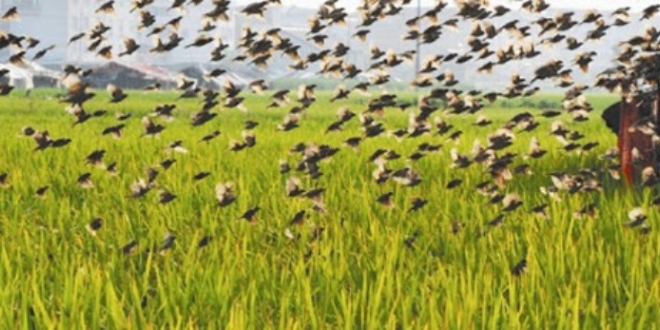Quelea birds have destroyed over 1,000 hectares of rice fields cultivated by 672 farmers during the 2021 cropping season in three local government areas in Yobe state.
This was disclosed by the All-Farmers Association of Nigeria (AFAN) Chairman in Nguru, Alhaji Modu Sandari, in Damaturu on Thursday.
He said the attacks took place in Nguru, Bade, Karasuwa and Yusufari local government areas of the state.
The AAFN chief said Quella birds are long-distance migrants with a range covering well over 10 million square kilometres of Africa’s semi-arid, bush, grassland and savannah regions. They often come in enormous numbers that destroy grain crops and, by roosting, break branches.
“It’s a pest in many different African countries, stretching from South Africa, north through countries like Tanzania, Kenya and Ethiopia, and all the way across the Sahel to Mauritania,” he said.
He said the Food and Agriculture Organisation (FAO) efforts to control quelea populations have had poor successes.
Although they prefer the seeds of wild grasses to those of cultivated crops, their huge numbers make them a constant threat to fields of sorghum, wheat, barley, millet and rice.
The average quelea bird eats around 10 grams of grain per day, so a flock of two million can devour as much as 20 tons of grain in a single day.
With an estimated adult breeding population of at least 1.5 billion, FAO estimates the agricultural losses attributable to the quelea in excess of US$50 million annually.
Meanwhile, the Federal Government has commenced the scaling up of aerial spraying of pesticides in the region.
Director of the Federal Ministry of Agriculture and Rural Development (FMARD) in Yobe, Alhaji Usman Ciromari, said the exercise was designed to destroy quelea bird nestings in Yobe and other parts of the region.
Ciroma said the aerial spray which began on Aug. 10, aimed at eliminating nests of the migratory birds had so far covered Ngalda, Wachakal and Gadaka areas of Yobe.
According to Ciroma, spraying the birds’ colonies with avicides is the only available method of controlling them at the moment.
The director, however, said if African countries could coordinate and conduct aerial spray simultaneously, the birds would be eliminated completely.
Quelea bird nesting colonies currently exist in Makawagabas, Makawayamma, Maikwankone, Maiyashi, Maigudu, Ruwan Tsamiya, Azur, Dala, Ngurodi and Dogana, with Jigawa state worse hit.









